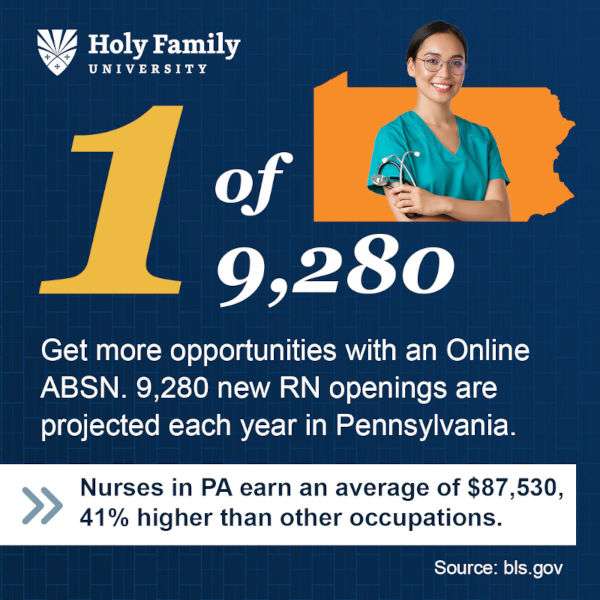Online accelerated BSN programs in Pennsylvania are a fast and convenient way to start your new career in nursing. If you already hold a bachelor’s degree, an accelerated nursing program prepares you to pass the NCLEX-RN with a BSN degree in less than two years.
Online programs like Holy Family University’s distance ABSN are designed to offer quality nursing education to people who don’t live near campus. This way, you don’t have to permanently relocate to earn your nursing degree. Among online ABSN programs in Pennsylvania, Holy Family offers a highly competitive price point.
Some hybrid or online ABSN programs still require frequent visits to campus or fixed locations near campus. Holy Family’s distance ABSN only requires one week of residency at our campus in Philadelphia, and our clinical placement department works to help you find a local site for your clinical hours.
Are You Considering Online 2-Year Nursing Programs in Pennsylvania?
Interested in accelerated nursing programs in Pennsylvania? You’re not alone! Nursing is a popular occupation in PA, and fortunately there are plenty of job openings as well. According to BLS, Pennsylvania has the 5th highest nursing employment rate per thousand jobs of all states, and the 5th highest location quotient. (Location quotient refers to the prevalence of an occupation in the area.)
Although a BSN is not currently a requirement for entry-level nursing positions, demand for BSN-prepared nurses is growing. In fact, 82% of employers surveyed by the AACN said that they prefer BSN degrees over RN or LPNs when hiring.

The ABSN Program from Holy Family University
Holy Family University’s distance accelerated BSN program in Pennsylvania is a fast way to change careers if you hold a bachelor’s in any field and want to become a nurse in Pennsylvania but don’t live near campus.
It’s important to note that while the online format reduces commute time and allows for more flexibility, the online format does not mean this program is easy. It is a fast-paced, highly rigorous program that condenses a typical four-year BSN program into just 14 months. It is very challenging but rewarding and requires a full-time commitment.
At an extremely competitive price, our accelerated nursing degree program prepares students to:
- Communicate and collaborate effectively
- Provide empathetic care to patients across diverse cultures
- Improve clinical judgment through critical thinking
- Understand today’s healthcare policies and issue
Learn more about Holy Family University’s Distance Hybrid BSN program.
Complete the form to access your ABSN program guide
Program Highlights
If you're exploring hybrid ABSN programs in Pennsylvania, here are some highlights of the Holy Family University program.
- Earn your BSN in only 14 months
- Only one on-campus residency (one week long)
- Holy Family University is accredited by the Middle States Commission on Higher Education (MSCHE) and the Commission on Collegiate Nursing Education (CCNE)*.
Get more information about our Distance Hybrid Accelerated BSN program in Pennsylvania.
* Online modality pending approval
Distance ABSN Program Requirements for Pennsylvania Residents
From our campus in Philadelphia, PA, Holy Family University offers an accredited Distance ABSN program for career-changers interested in nursing. This full-time program provides a great nursing education at outstanding value.
Eligible applicants will require:
- Bachelor’s degree in any field
- 3.0 cumulative GPA (2.75 GPA in math and science prerequisite courses)
- Personal statement
- 1 letter of recommendation from a supervisor or academic professor
Please note: Applicants in Pennsylvania must reside outside the following counties: Bucks, Chester, Delaware, Montgomery, & Philadelphia.
To take your next step in your application, visit this page.
The Job Market for Graduates of Online Nursing Programs in Pennsylvania
Compassionate registered nurses are in demand across the country, especially in Pennsylvania. Job growth across the state is higher than the national average. With 9,280 new RN jobs projected annually through 2030, your degree will provide job security, diverse opportunities to make a difference and higher earning potential.
According to the U.S. Bureau of Labor Statistics, the average annual salary for registered nurses in Pennsylvania is $87,530, which is 41% higher than all other occupations in the state.
Nurses work in a wide variety of settings, each offering unique opportunities and benefits. Whether you are looking for greater job stability, fulfillment, earning potential or diverse opportunities, there is a nursing role that is perfect for you. Upon graduating from our online accelerated BSN program in Pennsylvania, here are some of the exciting environments where nurses can thrive:
- Clinics
- Hospitals
- Urgent care facilities
- Ambulatory healthcare services
- Educational services
Additionally, nurses can explore unique roles such as:
- Temporary nursing: Gain diverse experience during short-term assignments
- Telehealth nursing: Provide care remotely, leveraging technology
- Home health nursing: Deliver personalized care to patients in their homes
- Public health nursing: Work on community and preventative health initiatives
With a variety of job openings and quality healthcare providers, Pennsylvania is a great place to start your nursing career. Holy Family University's Distance ABSN program empowers you to confidently change careers.
Nursing Salary and Job Outlook in Pennsylvania by the Numbers
|
Average |
Regional Salary Comparison |
Number of RNs |
|
|
Pennsylvania |
$87,530 |
+41% |
144,100 |
|
Pittsburgh |
$82,220 |
+33.5% |
27,470 |
|
Philadelphia |
$94,850 |
+39.7% |
72,060 |
|
Harrisburg |
$86,480 |
+44.6% |
8,640 |
Source: U.S. Bureau of Labor Statistics, May 2023
Complete the form to access your ABSN program guide
Nursing in Pittsburgh
Looking for an exciting blend of innovation and opportunity? Pittsburgh is a hub for medical research and treatments. Working here means you will be at the forefront of healthcare advancements, making it an exciting place to learn and grow throughout your nursing career.
Pittsburgh boasts a vibrant healthcare industry with top-ranked hospitals like UPMC Presbyterian Shadyside and Allegheny General Hospital. Whether you prefer the fast-paced environment of a bustling urban hospital or the close-knit feel of a community clinic, you will find a setting that matches your career goals and personal preferences.
With more than 13% of the regional workforce employed in healthcare-related roles, Pittsburgh offers more opportunities than the national average. This high concentration of healthcare jobs ensures you have plenty of options for professional growth and development.
Nursing in Central Pennsylvania
Harrisburg, Lancaster, York, and State College make up Central Pennsylvania, which is an excellent choice for a registered nurse starting their career. One of the standout benefits is the cost of living, which is about 20% lower than in major Northeast cities. This affordability extends to other essentials like groceries and transportation, making it easier for new nurses to manage their finances and enjoy a comfortable lifestyle.
The region is also home to several distinguished hospitals, including the Penn State Health Milton S. Hershey Medical Center, which has earned the prestigious Magnet designation from the American Nurses Credentialing Center (ANCC) multiple times, the highest national recognition for nursing excellence.
Nursing in Philadelphia
Philadelphia is an exceptional city for registered nurses, offering a blend of competitive salaries, a rich history, and top-ranked hospitals. The city’s vibrant healthcare sector ensures that nurses are in high demand, providing job security and numerous opportunities for career advancement.
Home to one of the nation’s first hospitals, Philadelphia has a rich history that continues to evolve today through high standards of care and healthcare innovation across the city. Working in a city with such a storied past can be both inspiring and motivating. Philadelphia is also home to some of the top-ranked hospitals in the country, including:
- University of Pennsylvania-Penn Presbyterian
- Jefferson Health-Thomas Jefferson University Hospitals
- Children’s Hospital of Philadelphia
Why Choose Holy Family University?
Holy Family University is a top regional school in the North, and also ranks for best BSN programs, according to U.S. News & World Report. We are a private Catholic institution that values diversity and inclusion, and we are committed to building an accessible and welcoming learning community for everyone.
Our accelerated nursing degree online program is priced competitively, and can be completed in only 14 months. Online coursework, combined with an on-campus residency and clinical placements at sites that are local to you, makes for a more flexible learning experience.
Graduates will be prepared for nursing licensure, ready to step into real-world situations. We provide comprehensive and proactive support, including exam preparation to help you pass the NCLEX-RN. Our clinical placement team helps you find local placement sites and preceptors, saving you time and energy that is better spent on your studies.
Holy Family University is in US News & World Report’s top 50 schools for Social Mobility.







